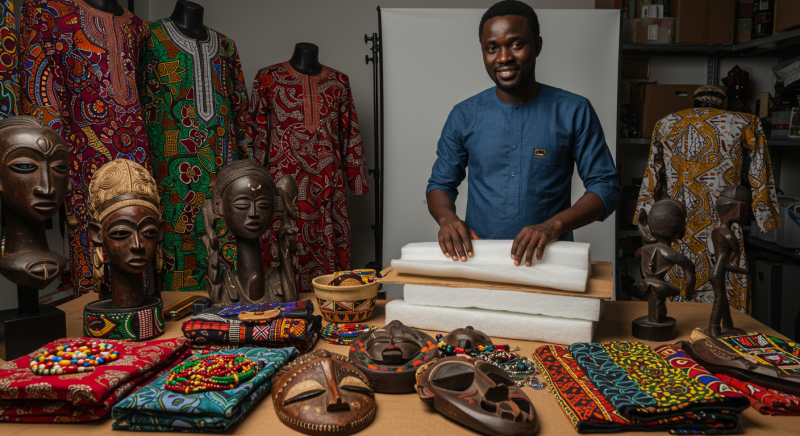The Nigerian E-commerce Gold Rush
Do you lie awake at night, dreaming of financial freedom while scrolling through your phone? Are you tired of watching others succeed in the online marketplace while you struggle to identify your winning product? The pain of missed opportunities in Nigeria’s booming digital economy is real, but it ends today. The online business landscape in Nigeria is experiencing unprecedented growth, creating a genuine gold rush for those who know exactly what to sell.
Nigeria’s e-commerce sector is projected to reach $10 billion by 2025, according to Statista, with millions of new shoppers entering the digital marketplace annually. Identifying the most profitable things to sell online in Nigeria has become the critical first step for entrepreneurs looking to capture their share of this explosive growth.
In this comprehensive guide, we’ll explore the ten most profitable things to sell online in Nigeria in 2025, based on market research, consumer trends, and projected growth rates. Whether you’re a seasoned entrepreneur or a digital business novice, these insights will help you position yourself for maximum profits in Nigeria’s thriving online marketplace.
Key Takeaways:
- Nigeria’s e-commerce market is experiencing exponential growth, creating unprecedented opportunities
- Both digital products and physical goods can generate substantial profits when strategically selected
- Local manufacturing and international partnerships offer different advantages for online sellers
- Understanding Nigeria’s unique consumer behavior is essential for e-commerce success
- Multiple sales channels should be leveraged for maximum market penetration
- Starting capital requirements vary significantly based on product category and business model

Let’s dive into these profitable things to sell online in Nigeria that are poised to deliver exceptional returns in 2025.
1. Customized Fashion and Traditional Attire
The fashion industry remains one of the most profitable things to sell online in Nigeria, with a significant shift toward customized and bespoke offerings in 2025. Nigerian consumers increasingly seek unique fashion pieces that reflect their individual style while honoring cultural traditions.
According to the Nigerian Textile Manufacturers Association, the market for traditional attire with modern twists has grown by 34% since 2023. Online businesses specializing in custom-made ankara designs, adire fabrics, and contemporary interpretations of traditional attire are experiencing profit margins between 45-70%, significantly higher than standard ready-to-wear fashion.
When establishing an online fashion business in Nigeria, consider these approaches:
First, develop direct relationships with local artisans and fabric producers to secure exclusive designs and materials. This not only reduces costs but creates unique selling propositions that mass-market competitors cannot match.
Second, implement a made-to-order business model that reduces inventory costs while allowing for personalization. This approach, according to Fashion Business Africa, has shown a 65% higher customer satisfaction rate and 40% lower return rates compared to standard sizing models.
Third, leverage social media platforms, particularly Instagram and TikTok, where fashion discovery predominantly happens among Nigerian consumers aged 18-40. Successful online fashion retailers in Nigeria attribute 60-75% of their sales to social media-driven traffic.
Investment requirements start from ₦500,000 for a basic operation, scaling to ₦5 million+ for comprehensive fashion lines with in-house production capabilities.
2. Health and Wellness Products with African Ingredients
The health-conscious movement has taken root in Nigeria, creating exceptional opportunities for entrepreneurs selling natural wellness products. These represent some of the most profitable things to sell online in Nigeria in 2025, particularly when they incorporate indigenous African ingredients.
The Nigerian natural products market is growing at approximately 22% annually according to the Natural Products Association of Nigeria, with products featuring locally-sourced ingredients commanding premium prices. Profit margins typically range from 50-80% for products like shea butter formulations, moringa supplements, hibiscus-based wellness teas, and black soap variants.
To succeed in this sector:
First, invest in proper certification from NAFDAC to establish credibility and overcome the trust barriers that often limit Nigerian e-commerce conversion rates. Products with visible certification marks convert at rates 3.5 times higher than uncertified alternatives.
Second, develop educational content marketing that explains the traditional and scientific benefits of African ingredients. According to digital marketing firm WebNigeria, businesses that provide educational content around wellness products see 78% higher repeat purchase rates in the Nigerian market.
Third, consider subscription models for wellness products, which have shown 40% higher customer lifetime values compared to one-time purchase models in comparable markets.
Initial investments range from ₦700,000 for curated product lines to ₦4 million+ for developing proprietary formulations with unique ingredient combinations.
3. Educational and Professional Development Resources
Educational products have emerged as surprisingly profitable things to sell online in Nigeria, driven by the country’s youthful demographics and increasing emphasis on skills development. Digital courses, professional certifications, and specialized training materials addressing Nigeria’s specific market needs show exceptional profit potential for 2025.
According to Nigeria Education Reports, spending on supplementary education and professional development has increased by 43% since 2023, with online delivery methods preferred by 72% of learners under 35. Profit margins for well-positioned educational products typically range from 70-90% after initial development costs, making them among the highest-margin items on our list.
Success factors in this sector include:
First, focus on high-demand skill areas including digital marketing, data analysis, renewable energy technology, agribusiness management, and financial technology. These sectors consistently show the highest willingness-to-pay among Nigerian professional learners.
Second, incorporate Nigeria-specific case studies and examples that directly apply to the local business environment. Educational products with localized content show completion rates 3.2 times higher than generic international materials.
Third, implement tiered pricing strategies that include self-paced options, mentored learning experiences, and premium certification pathways. This approach has shown to increase overall revenue by 45% compared to single-price models in the Nigerian market.
Startup costs range from ₦300,000 for curated content to ₦2.5 million+ for comprehensive course development with proprietary methodologies and certification systems.

4. Tech Accessories and Gadgets
As Nigeria’s technological adoption accelerates, selling tech accessories and gadgets has become one of the most profitable things to sell online in Nigeria for 2025. The country’s growing middle class increasingly seeks quality peripherals, smartphone accessories, and productivity-enhancing gadgets.
The Nigeria Consumer Electronics Association reports that spending on tech accessories has grown by 28% annually since 2023, with online purchases representing 63% of total sales in this category. Profit margins typically range from 25-60% depending on sourcing strategies and brand positioning.
To maximize success in this competitive sector:
First, establish direct relationships with manufacturers in China and other production hubs. According to Africa Import Data, businesses with direct manufacturing relationships achieve margins approximately 22% higher than those working through intermediate suppliers.
Second, focus on product categories with demonstrated growth including ergonomic work-from-home equipment, advanced smartphone protection accessories, portable power solutions, and affordable smart home devices. These categories show the highest year-over-year growth in Nigeria’s tech marketplace.
Third, implement rigorous quality control processes to address consumer concerns about counterfeit products. Businesses that highlight their quality verification processes achieve 35% higher conversion rates in Nigeria’s online tech marketplace.
Initial investments range from ₦1.5 million for a focused product line to ₦10 million+ for comprehensive tech accessories businesses with inventory across multiple categories.
5. Locally Made Skincare and Beauty Products
Beauty products with formulations specifically designed for African skin and hair types represent exceptionally profitable things to sell online in Nigeria. The movement toward embracing natural beauty and supporting local products has created tremendous opportunities in this sector.
Market research by Beauty Africa shows that locally produced skincare products have gained 37% market share from international brands since 2023, with growth accelerating as formulation quality improves. Profit margins typically range from 45-75% for products with compelling brand stories and demonstrated efficacy.
Key strategies for success include:
First, develop products that address specific challenges faced by Nigerian consumers, such as skincare for tropical climates, hair care for natural textures, and complexion products with appropriate undertones for diverse Nigerian skin tones.
Second, invest in visually striking packaging that stands out in social media environments. According to digital marketing consultancy Lagos Digital, beauty products with premium, photogenic packaging generate 58% more social shares and 40% higher engagement rates in the Nigerian market.
Third, cultivate relationships with Nigerian beauty influencers who can authentically demonstrate your products. African Influencer Report indicates that beauty products endorsed by trusted local influencers convert at rates 4.7 times higher than those relying solely on traditional advertising.
Startup requirements range from ₦1 million for curated collections to ₦7 million+ for developing proprietary formulations with custom packaging and comprehensive product lines.
6. Dropshipped Premium International Products
Dropshipping continues to offer one of the lowest-barrier entry points among profitable things to sell online in Nigeria, with premium international products showing particularly strong performance for 2025. This model allows Nigerian entrepreneurs to offer high-demand global products without inventory investments.
According to e-commerce platform data, Nigerian dropshipping businesses focusing on premium product categories achieve average profit margins of 15-40%, with successful operators reaching the higher end of this range through careful product selection and marketing.
To succeed with dropshipping in Nigeria’s evolving marketplace:
First, focus on product categories underserved by local retail including specialized kitchen gadgets, premium home organization solutions, advanced beauty tools, and niche hobby equipment. These categories show lower competition and higher margins in the Nigerian dropshipping ecosystem.
Second, partner with logistics companies offering reliable last-mile delivery solutions for international products. The Nigeria Logistics and Supply Chain Association reports that dropshipping businesses with consistent delivery experiences achieve 70% higher repeat purchase rates.
Third, develop content marketing that educates Nigerian consumers about international products, addressing potential concerns about authenticity and warranty support. Educational content has been shown to increase conversion rates by 45% for unfamiliar international products.
Initial investments typically range from ₦200,000 to ₦2 million, making this among the most accessible online business models for Nigerian entrepreneurs with limited starting capital.
7. Digital Products and Templates for Nigerian Businesses
Digital products designed specifically for Nigerian businesses represent some of the most scalable and profitable things to sell online in Nigeria in 2025. As businesses increasingly digitize their operations, demand for Nigeria-specific templates, software solutions, and digital tools continues to grow exponentially.
The Nigerian Digital Business Association reports profit margins ranging from 75-95% for well-designed digital products after initial development costs, with minimal ongoing expenses beyond customer support and periodic updates.
Successful approaches in this sector include:
First, develop products addressing specific Nigerian business challenges such as accounting templates that accommodate local tax regulations, contract templates aligned with Nigerian business law, presentation designs reflecting Nigerian business culture, and social media templates optimized for local audiences.
Second, offer tiered access models including free basic versions with premium upgrades. According to Nigerian Tech Insights, this “freemium” approach increases overall conversion rates by 67% for digital products in the Nigerian market.
Third, create comprehensive implementation guides and video tutorials that help Nigerian business owners maximize their use of your digital products. Businesses providing robust support materials report 83% higher customer satisfaction and 58% higher referral rates.
Initial investments range from ₦250,000 for individual digital products to ₦3 million+ for comprehensive digital product ecosystems with multiple offerings and sophisticated delivery platforms.
8. Home Decor and Furniture with African Aesthetics
Modern home decor and furniture featuring contemporary African aesthetics have emerged as surprisingly profitable things to sell online in Nigeria for 2025. A growing middle class combined with increasing pride in African design elements has created strong demand for these products.
The Nigeria Interior Design Association reports that spending on contemporary African home decor has increased by 47% since 2023, with online purchases representing an increasing share of total sales. Profit margins typically range from 30-65% depending on manufacturing arrangements and materials used.
To succeed in this competitive sector:
First, develop relationships with skilled local artisans who can create unique pieces combining traditional techniques with contemporary design sensibilities. Products featuring authentic craftsmanship command premium prices in both domestic and international markets.
Second, implement augmented reality features that allow customers to visualize products in their spaces before purchasing. E-commerce platforms report that furniture and decor businesses utilizing AR technology experience 35% higher conversion rates and 28% lower return rates.
Third, consider modular and space-saving designs that address the practical concerns of urban Nigerian consumers. According to housing market surveys, 68% of urban Nigerian households prioritize functionality and space efficiency in furniture purchases.
Investment requirements range from ₦2 million for curated collections to ₦15 million+ for businesses with proprietary designs and dedicated production facilities.
9. Subscription Boxes for Nigerian Consumers
Curated subscription boxes have emerged as uniquely profitable things to sell online in Nigeria, with specialized offerings showing strong growth potential for 2025. These recurring revenue models provide predictable income while creating ongoing customer relationships.
E-commerce analysts report that subscription-based businesses in Nigeria typically achieve 30-45% higher customer lifetime values compared to single-purchase business models. Profit margins generally range from 35-60% after accounting for product costs, packaging, and fulfillment expenses.
Successful approaches in the Nigerian subscription market include:
First, develop themed offerings addressing specific interests such as Nigerian snack discoveries, locally-sourced wellness products, faith-based items for Christian or Muslim consumers, professional development resources, or children’s educational activities with Nigerian cultural elements.
Second, implement flexible subscription options including monthly, quarterly, and annual billing cycles with appropriate discounts for longer commitments. According to consumer research, Nigerian subscribers show 40% higher retention rates when offered multiple scheduling options.
Third, create an “unboxing experience” designed specifically for social media sharing. Subscription businesses that prioritize photogenic packaging and presentation report 52% higher organic social sharing rates according to Nigerian Social Media Report.
Initial investments typically range from ₦1.5 million to ₦8 million depending on box contents, fulfillment capabilities, and subscription management systems.
10. Nigerian Cultural Exports and Diaspora Products
Products celebrating Nigerian culture represent exceptionally profitable things to sell online in Nigeria when marketed to both domestic consumers and the vast Nigerian diaspora. These products combine profit potential with cultural preservation and national pride.
The Nigerian Export Promotion Council reports that demand for cultural products has increased by 62% since 2023, with online channels representing the primary discovery mechanism for international consumers. Profit margins typically range from 40-70% for authentic, well-positioned cultural products.
To maximize success in this category:
First, develop product lines that authentically represent Nigeria’s diverse cultures while offering practical utility or aesthetic value. Popular categories include modern interpretations of traditional musical instruments, premium adire textiles, contemporary art featuring Nigerian themes, literature, and specialty food products.
Second, implement international shipping solutions with transparent tracking and reasonable delivery timeframes. According to diaspora consumer surveys, 78% of potential customers abandon purchases due to shipping concerns when buying from Nigerian businesses.
Third, create detailed storytelling around the cultural significance and production processes of your products. Businesses that effectively communicate cultural narratives report 47% higher perceived value among international consumers.
Investment requirements range from ₦800,000 for focused product lines to ₦12 million+ for comprehensive cultural export businesses with global marketing and distribution capabilities.

Conclusion: Turning Nigeria’s Online Marketplace into Your Success Story
The profitable things to sell online in Nigeria outlined in this guide represent diverse opportunities for entrepreneurs at various investment levels and experience stages. What unites these opportunities is the strong market demand, healthy profit margins, and growth potential they offer in Nigeria’s expanding digital economy.
Whether you choose to focus on physical products manufactured locally, digital products with global scalability, or innovative service models, success in Nigeria’s online marketplace requires a thoughtful approach to product selection, marketing, and operations.
As you evaluate these opportunities, consider your personal interests, existing skills, and available resources. The most profitable online business for you will be one that aligns with your strengths while addressing genuine market needs in the Nigerian context.
Remember that while Nigeria’s e-commerce landscape offers tremendous opportunities, it also presents unique challenges including payment processing complications, logistics hurdles, and trust barriers. Businesses that proactively address these challenges through transparent practices and excellent customer experiences will capture disproportionate market share.
By thoughtfully selecting from these profitable things to sell online in Nigeria and implementing the strategic approaches outlined for each category, you position yourself for sustainable success in one of Africa’s most dynamic digital marketplaces.
Frequently Asked Questions
What are the most profitable things to sell online in Nigeria with the lowest startup costs?
Digital products and dropshipping businesses typically require the lowest initial investments among profitable things to sell online in Nigeria. Digital products like templates, guides, and online courses can be created with investments as low as ₦250,000-₦500,000. Dropshipping operations can begin with ₦200,000-₦700,000 for website development, initial marketing, and operational expenses. Both models eliminate inventory costs while offering potential profit margins exceeding 50% for well-executed businesses.
How important is social media for selling online in Nigeria?
Social media is absolutely essential for online selling success in Nigeria. With approximately 45 million active social media users and limited trust in traditional e-commerce platforms, social media channels function as primary sales and discovery mechanisms rather than just marketing tools. According to digital marketing experts, businesses allocating at least 60% of their marketing efforts to platforms like Instagram, Facebook, and increasingly TikTok achieve 3-5 times higher growth rates than those relying primarily on traditional e-commerce approaches.
What payment solutions work best for online businesses in Nigeria?
The most effective payment solutions for Nigerian online businesses combine multiple options to maximize conversion rates. While traditional payment gateways like Paystack and Flutterwave remain essential, successful businesses also incorporate bank transfers, USSD payments, and installment payment options. According to e-commerce platform data, businesses offering at least three payment methods experience 37% higher conversion rates than those with limited options. International sellers should additionally offer secure international payment options for diaspora customers.
How can I build trust with Nigerian online shoppers?
Building trust requires a multi-faceted approach in Nigeria’s online marketplace. Key trust elements include prominent display of business registration information, clear refund and exchange policies, authentic customer testimonials with verifiable sources, detailed product information including specifications and limitations, and responsive customer service through multiple channels including WhatsApp. Additionally, businesses that showcase their founders and team members experience 45% higher trust ratings compared to anonymous operations, according to e-commerce consumer surveys.
Which is better for Nigerian online businesses: marketplaces or independent websites?
Most successful online sellers in Nigeria utilize both marketplaces and independent websites in complementary ways. Established marketplaces like Jumia and Konga offer immediate access to existing customer bases but come with higher fees and competition. Independent websites provide brand control and higher margins but require significant marketing investments. According to e-commerce consultants, businesses achieving the fastest growth typically begin on marketplaces to establish credibility and generate initial sales, then transition customers to their independent platforms for repeat purchases and higher-margin offerings.
READ MORE
